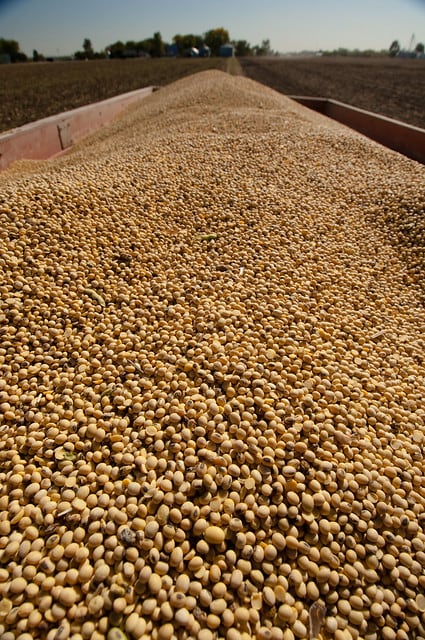The FDA took many in the industry by surprise in October 2017 by proposing to revoke a health claim on the relationship between soy protein and reduced risk of heart disease, citing “inconsistent findings” from research published since the claim was authorized in 1999.
A new study* – published in the Journal of Nutrition – analyzed the 46 controlled trials on which the FDA will base its decision, and “support [s] the advice given to the general public internationally to increase plant protein intake.”
But is a 3-4% reduction enough to warrant a health claim, and why is the FDA considering revoking the claim - a move backed by the American Heart Association (see box below) - if the evidence is so strong?
Study co-author Mark Messina, an adjunct professor at Loma Linda University and the executive director of the Soy Nutrition Institute, told FoodNavigator-USA: “The FDA didn’t meta-analyze the data. It simply determined the number of studies that reported a statistically significant decrease in total cholesterol or LDL-C.
"According to the FDA, of the 46 studies, 19 (41%) reported a significant decrease in LDL-C. The FDA indicated that percentage isn’t enough to justify an unqualified health claim.”
The current approved health claim: '25 grams of soy protein a day, as part of a diet low in saturated fat and cholesterol, may reduce the risk of heart disease.'
Health Canada has an approved claim
He added: “My understanding is the issue is not the magnitude of the decrease but the consistency of the data. However, Health Canada approved a health claim for soy protein in 2015 (similar to the U.S. claim), even though it found only a minority of studies reported a statistically significant decrease in LDL-C. But because Health Canada also found that most studies reported a decrease, an unqualified health claim was deemed warranted.
"That is what the meta-analysis found also; most studies reported a decrease in response to soy protein in comparison to the control protein, but only a minority were statistically significant.”
It’s also worth noting that “when one looks at the data for all dietary approaches to lowering cholesterol, one finds there is a huge variation in results among studies,” he pointed out. “This comment applies to even well-accepted dietary approaches for lowering cholesterol.”
Is a 3-4% reduction in LDL meaningful?
But how meaningful is a 3.2% reduction in LDL?
“Over time, each 1% reduction in cholesterol is thought to lower coronary heart disease risk by 1-2%,” said Messina. “So, at the population level, in theory, making soy protein a regular part of the diet could meaningfully reduce the CHD burden facing Americans.
“Fiber, which has a health claim, is generally viewed as lowering LDL-C about 4% whereas phytosterols/stanols lower LDL-C about 10%. In any event, as has been previously shown by several investigators, but especially by David Jenkins and colleagues via the portfolio diet, markedly reducing LDL-C by dietary means requires a comprehensive approach.
"Soy protein plays an important role in the portfolio diet (22 g protein/1,000 calories). It is used because it is a high-quality protein and lowers cholesterol.”
Why does soy get a bad rap?

Asked why he thought soy continued to get a bad rap in some parts of the natural products industry owing to anti-GMO sentiment, concerns about soy isoflavones, or the perception of soy as a ‘big food’ crop, Messina argued that perceptions were changing, albeit slowly.
Soy and breast cancer: Soy does not increase risk, and may even be protective
“The soy-breast cancer controversy is a good case study... In the 1990s, a series of rodent studies began to be published suggesting soy/isoflavones [estrogen-like components in soy] could be harmful to breast cancer patients, and for the subsequent decade the public mostly heard that soy could be harmful to breast cancer patients and women at risk of developing breast cancer.
“However, for the past 10 years, the human data have consistently been in support of the safety, and possibly even benefit, of soy for breast cancer patients. For this reason, in 2012, the American Cancer Society and the American Institute for Cancer Research concluded that soyfoods can be safely consumed by breast cancer patients.
"In 2014, the World Cancer Research Fund International concluded that soyfoods might benefit breast cancer patients."
He added: "In 2015, the European Food Safety Authority concluded isoflavone supplements don’t adversely affect breast tissue, an opinion shared by the Permanent Senate Commission on Food Safety of the German Research Foundation in 2018.
“As a result of these research developments, over the past five to seven years, media coverage of the breast cancer controversy has changed dramatically to reflect this newer understanding. It will take some time for this message to reach the public, but I do think it will.”
Soy and feminization: Concerns ‘completely unfounded’
“In 2009, a national consumer health publication [Men’s Health] potentially damaged the image of soy with a lead article about feminization,” said Messina.
However, a 2009 meta-analysis of the clinical research found that soy does not affect circulating levels of testosterone, with the authors concluding that “neither soy foods nor isoflavone supplements alter measures of bioavailable testosterone concentrations in men,” while a 2010 review conducted by Messina concluded that the clinical research shows soy does not affect estrogen levels in men.
He added: “Little by little, media are becoming aware of the data.”
Soy and muscle building
There was also some very positive news about the benefits of soy vs animal protein in a 2018 meta-analysis, which found that soy protein promotes gains in strength and lean tissue accretion in response to resistance exercise to the same extent as animal protein, added Messina.
“It will take a while for this finding to reach the weight-lifting community, but eventually it will. So little by little the science is being communicated to the public, which hopefully, will lead to improved public perception, especially at a time when the environmental impact of food increasingly appears to influence food purchases.
"Growing soybeans may be the most efficiently produced means of obtaining dietary protein.”
Source: The Journal of Nutrition 2019 Apr 22. pii: nxz020. doi: 10.1093/jn/nxz020. [Epub ahead of print]
A Meta-Analysis of 46 Studies Identified by the FDA Demonstrates that Soy Protein Decreases Circulating LDL and Total Cholesterol Concentrations in Adults.
Authors: Blanco Mejia S, Messina M, Li SS, Viguiliouk E, Chiavaroli L, Khan TA, Srichaikul K1, Mirrahimi A, Sievenpiper JL Kris-Etherton P, Jenkins DJA
The study was funded by the Canadian Institutes of Health Research through the Canada-wide Human Nutrition Trialists’ Network.
Read a selection of comments from stakeholders below about the decision now facing the FDA:
Soy Nutrition Institute: Health Canada approved a health claim for soy protein even though a slightly lower percentage of studies (33% vs 41%) actually showed a statistically significant reduction in LDL-C when compared to the evaluation by the FDA.
CSPI: Collectively, the results of these 46 studies were inconsistent and inconclusive. Therefore, the evidence does not meet the standard for significant scientific agreement required for a health claim for soy protein for heart health.
National Milk Producers Federation: We are troubled that the aura of health and cardiovascular protection engendered by the soy protein health claim – which now appears unjustified, according to FDA’s proposed rule – has undoubtedly benefited food manufacturers who seek to market soy-based products as “milk”, “cheese”, “yogurt” or other dairy imitators.
American Heart Association: We agree with the agency’s tentative conclusion: the health claim does not meet the significant scientific agreement (SSA) standard and should be revoked…. We too have conducted multiple reviews of the evidence describing the relationship between soy protein and CHD; and like the FDA, we too have found that the evidence no longer supports a SSA level health claim.
Academy of Nutrition and Dietetics: The Academy agrees with the FDA’s tentative conclusion that that the evidence does not support FDA’s previous determination that there is significant scientific agreement to support an authorized health claim for the relationship between soy protein and reduced risk of coronary heart disease.

